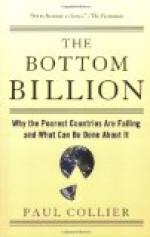Such a poem is Ulysses. It is shot through and through with the spirit of strenuous and never-ceasing endeavor—a spirit manifest in a hero who has every temptation to rest and enjoy. Ulysses is old. After ten long years of warfare before Troy, after endless misfortunes on his homeward voyage, after travels and experiences that have taken him everywhere and shown him everything that men know and do, he has returned to his rude native kingdom. He is reunited with his wife Penelope and his son Telemachus. He is rich and famous. Yet he is unsatisfied. The task and routine of governing a slow, materially minded people, though suited to his son’s temperament, are unsuited to his. He wants to wear out rather than to rust out. He wants to discover what the world still holds. He wants to drink life to the lees. The morning has passed, the long day has waned, twilight and the darkness are at hand. But scant as are the years left to him, he will use them in a last, incomparable quest. He rallies his old comrades—tried men who always
“With a frolic welcome took
The thunder and the sunshine”—
and asks them to brave with him once more the hazards and the hardships of the life of vast; unsubdued enterprise.
It little profits that an idle king,
By this still hearth, among these barren
crags,
Match’d with an aged wife, I mete
and dole
Unequal laws unto a savage race,
That hoard, and sleep, and feed, and know
not me.
I cannot rest from travel; I will drink
Life to the lees. All times I have
enjoy’d
Greatly, have suffer’d greatly,
both with those
That loved me, and alone; on shore, and
when
Thro’ scudding drifts the rainy
Hyades
Vext the dim sea. I am become a name;
For always roaming with a hungry heart
Much have I seen and known,—cities
of men
And manners, climates, councils, governments,
Myself not least, but honor’d of
them all,—
And drunk delight of battle with my peers,
Far on the ringing plains of windy Troy.
I am a part of all that I have met;
Yet all experience is an arch wherethro’
Gleams that untravell’d world whose
margin fades
For ever and for ever when I move.
How dull it is to pause, to make an end,
To rust unburnish’d, not to shine
in use!
As tho’ to breathe were life!
Life piled on life
Were all too little, and of one to me
Little remains; but every hour is saved
From that eternal silence, something more,
A bringer of new things; and vile it were
For some three suns to store and hoard
myself,
And this gray spirit yearning in desire
To follow knowledge like a sinking star,
Beyond the utmost bound of human thought.
This is my son, mine own Telemachus,
To whom I leave the sceptre and the isle,—
Well-beloved of me, discerning to fulfil
This labor, by slow prudence to make mild




